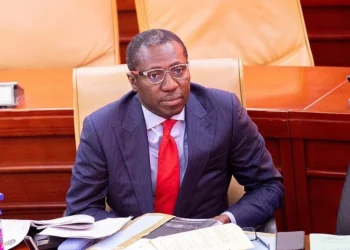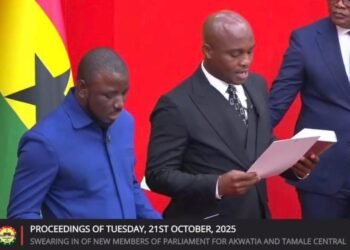Lawyer Martin Kpebu has stated that President Mahama’s decision to create a Minister of State for the Public Sector demonstrates the president’s commitment to public sector reforms under the “Reset Ghana” agenda, particularly amid the growing issue of political patronage.
He noted that Ghanaians have consistently called for significant improvements in the sector.
However, the main concern is that despite previous administrations’ focus on public sector reforms, tangible progress has remained limited.
As a result, President Mahama’s nomination of Lydia Lamisi Akanvariba for the role does not necessarily inspire much public confidence.
Nevertheless, Kpebu maintained that the portfolio is necessary, highlighting a major criticism—the public sector, with over 400,000 employees, is seen as over-bloated, among other structural challenges.
“You know, when the IMF was in the 80s, we did a structural adjustment, et cetera. We did a lot of layoffs, redundancies, et cetera. But over the decades, political patronage mostly has led to the over-bloating of the public sector once again.
“So, with a minister responsible for the public sector, I’m hoping that we are going to look into it and see how to realign, cut down numbers where they have to be cut down, and socially make it more efficient”.
Martin Kpebu
Kpebu further elaborated that political patronage is a key driver of the public sector’s overstaffing.
He explained that every new government tends to scrutinize the institutions inherited from its predecessor, identifying individuals believed to have political affiliations with the previous administration.
This practice often leads to systematic sidelining or outright removal of such individuals, making room for the appointment of new personnel who are loyal to the incoming government.

He pointed to a recent example, noting that under the current administration, the Minister of Finance recruited a significant number of individuals from Databank and other networks closely associated with the ruling party.
This, he argued, reflects a broader pattern where each administration favors its own allies, swelling the public sector rather than making it more efficient. “Then the numbers keep going, you see”.
Kpebu emphasized that this cycle of politically motivated appointments and dismissals creates instability and inefficiency within state institutions.
While not every previous appointee is removed, the general practice of replacing staff based on political loyalty rather than merit leads to continuous growth in public-sector employment.
Over time, this contributes to the perception of an over-bloated bureaucracy, where competence is often sacrificed for political expediency.
Calls for End to Political Patronage
Furthermore, Martin Kpebu stressed the urgency of addressing the long-standing issue of political patronage in public sector employment.
He asserted that the country has reached a point where decisive action is necessary to put an end to this unsustainable cycle of politically motivated appointments.
Undoubtedly, the practice of using public sector jobs as a reward for party loyalty has significantly contributed to inefficiencies and an over-bloated workforce.
Thus, policymakers are urged to take bold steps in reforming the system to ensure that recruitment and retention are based on competence rather than political allegiance.
Accordingly, Kpebu expressed hope that the newly appointed Minister responsible for the public sector, Lydia Lamisi Akanvariba would prioritize this issue and implement measures to depoliticize appointments.

He emphasized the need for clear, merit-based hiring policies that would enhance efficiency and restore public confidence in state institutions.
“Except that, let’s also mention that it’s not only in Ghana. This practice has been there for about 200 years. Actually, from American history,… it started mainly with President Garfield, who was even killed because the people thought that he wasn’t giving enough of their own people, power”.
Martin Kpebu
However, Kpebu emphasized that while it may exist elsewhere, Ghana must take urgent steps to address it, as the continuous expansion of the public sector due to politically motivated appointments is unsustainable.
He argued that if left unchecked, this trend will further strain national resources, reduce institutional effectiveness, and hinder efforts to create a more professional and results-driven public service.
Kpebu expressed confidence in President Mahama and Lydia Lamisi Akanvariba, the newly nominated Minister for Public Sector, stating that they have the potential to drive meaningful reforms.
He urged them to prioritize policies that depoliticize public sector appointments and establish a transparent, merit-based recruitment system.
According to him, well-implemented reforms would not only reduce excessive numbers in the sector but also enhance efficiency, improve service delivery, and restore public confidence in Ghana’s governance institutions.
READ ALSO: GSE Sees Positive Momentum as Bulls Return






















